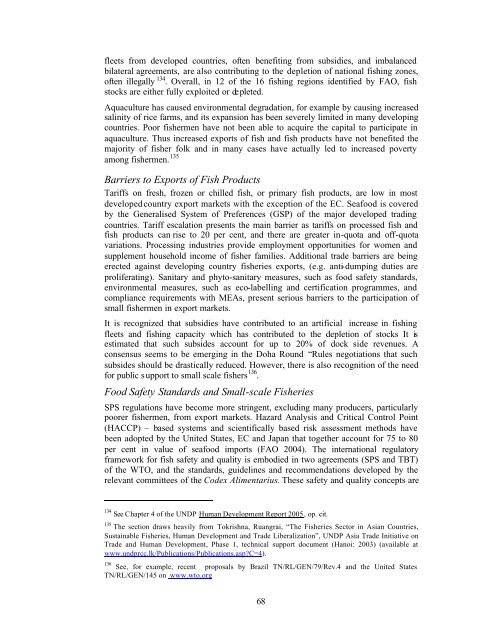Trade Policy Note Final-rev08 - Development
Trade Policy Note Final-rev08 - Development
Trade Policy Note Final-rev08 - Development
You also want an ePaper? Increase the reach of your titles
YUMPU automatically turns print PDFs into web optimized ePapers that Google loves.
fleets from developed countries, often benefiting from subsidies, and imbalanced<br />
bilateral agreements, are also contributing to the depletion of national fishing zones,<br />
often illegally 134 . Overall, in 12 of the 16 fishing regions identified by FAO, fish<br />
stocks are either fully exploited or depleted.<br />
Aquaculture has caused environmental degradation, for example by causing increased<br />
salinity of rice farms, and its expansion has been severely limited in many developing<br />
countries. Poor fishermen have not been able to acquire the capital to participate in<br />
aquaculture. Thus increased exports of fish and fish products have not benefited the<br />
majority of fisher folk and in many cases have actually led to increased poverty<br />
among fishermen. 135<br />
Barriers to Exports of Fish Products<br />
Tariffs on fresh, frozen or chilled fish, or primary fish products, are low in most<br />
developed country export markets with the exception of the EC. Seafood is covered<br />
by the Generalised System of Preferences (GSP) of the major developed trading<br />
countries. Tariff escalation presents the main barrier as tariffs on processed fish and<br />
fish products can rise to 20 per cent, and there are greater in-quota and off-quota<br />
variations. Processing industries provide employment opportunities for women and<br />
supplement household income of fisher families. Additional trade barriers are being<br />
erected against developing country fisheries exports, (e.g. anti-dumping duties are<br />
proliferating). Sanitary and phyto-sanitary measures, such as food safety standards,<br />
environmental measures, such as eco-labelling and certification programmes, and<br />
compliance requirements with MEAs, present serious barriers to the participation of<br />
small fishermen in export markets.<br />
It is recognized that subsidies have contributed to an artificial increase in fishing<br />
fleets and fishing capacity which has contributed to the depletion of stocks It is<br />
estimated that such subsides account for up to 20% of dock side revenues. A<br />
consensus seems to be emerging in the Doha Round “Rules negotiations that such<br />
subsides should be drastically reduced. However, there is also recognition of the need<br />
for public support to small scale fishers 136 .<br />
Food Safety Standards and Small-scale Fisheries<br />
SPS regulations have become more stringent, excluding many producers, particularly<br />
poorer fishermen, from export markets. Hazard Analysis and Critical Control Point<br />
(HACCP) – based systems and scientifically based risk assessment methods have<br />
been adopted by the United States, EC and Japan that together account for 75 to 80<br />
per cent in value of seafood imports (FAO 2004). The international regulatory<br />
framework for fish safety and quality is embodied in two agreements (SPS and TBT)<br />
of the WTO, and the standards, guidelines and recommendations developed by the<br />
relevant committees of the Codex Alimentarius. These safety and quality concepts are<br />
134 See Chapter 4 of the UNDP Human <strong>Development</strong> Report 2005, op. cit.<br />
135 The section draws heavily from Tokrishna, Ruangrai, “The Fisheries Sector in Asian Countries,<br />
Sustainable Fisheries, Human <strong>Development</strong> and <strong>Trade</strong> Liberalization”, UNDP Asia <strong>Trade</strong> Initiative on<br />
<strong>Trade</strong> and Human <strong>Development</strong>, Phase 1, technical support document (Hanoi: 2003) (available at<br />
www.undprcc.lk/Publications/Publications.asp?C=4).<br />
136 See, for example, recent proposals by Brazil TN/RL/GEN/79/Rev.4 and the United States<br />
TN/RL/GEN/145 on www.wto.org<br />
68
















